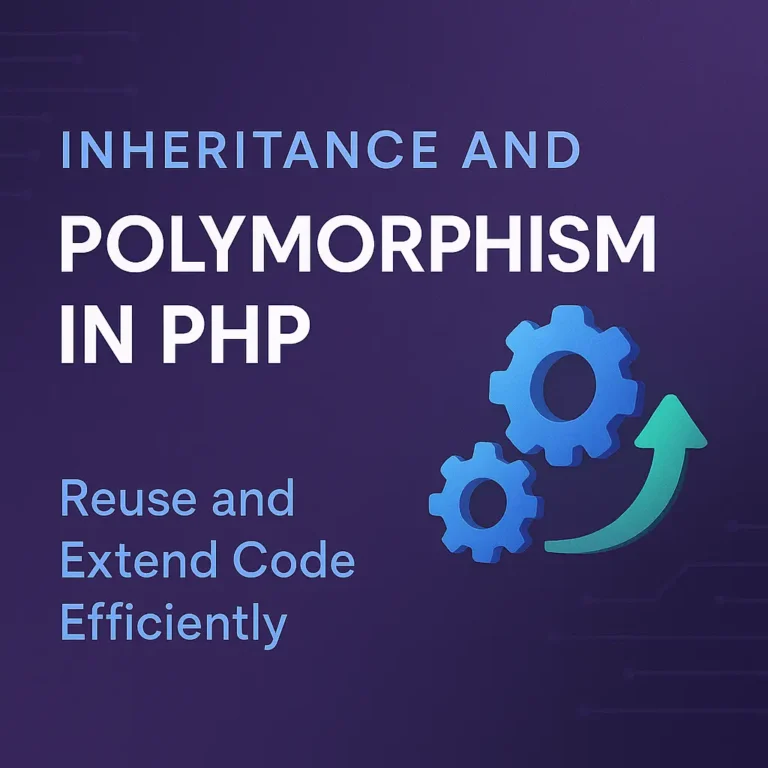These features allow developers to specify the expected data types of function parameters and return values, leading to more robust and maintainable code. In this article, we will explore type hinting for parameters and return types, as well as scalar type declarations in PHP.
Type Hinting for Parameters and Return Types
What is Type Hinting?
Type hinting allows developers to specify the type of arguments a function or method expects. This feature ensures that the provided arguments match the specified type, helping to catch errors early and improve code readability.
Type Hinting for Parameters
Prior to PHP 7, type hinting was limited to class names, arrays, and callable types. PHP 7 introduced support for scalar types (integers, floats, strings, and booleans), allowing for more comprehensive type hinting.
Example: Class Type Hinting
class User {
public $name;
}
class UserManager {
public function addUser(User $user) {
// Add user to the database
echo "User {$user->name} added.\n";
}
}
$user = new User();
$user->name = "John Doe";
$manager = new UserManager();
$manager->addUser($user);
In this example, the addUser method expects an instance of the User class. If an argument of a different type is passed, PHP will throw a TypeError.
Example: Array and Callable Type Hinting
class ArrayHandler {
public function processArray(array $data) {
// Process the array
echo "Array processed with " . count($data) . " elements.\n";
}
public function executeCallable(callable $callback) {
// Execute the callable
$callback();
}
}
$handler = new ArrayHandler();
$handler->processArray([1, 2, 3, 4]);
$handler->executeCallable(function() {
echo "Callable executed.\n";
});
In this example, the processArray method requires an array, and executeCallable requires a callable. Passing incorrect types will result in a TypeError.
Type Hinting for Return Types
PHP 7 also introduced return type declarations, allowing functions and methods to specify the type of value they will return.
Example: Return Type Declarations
class Calculator {
public function add(int $a, int $b): int {
return $a + $b;
}
public function divide(float $a, float $b): float {
if ($b === 0.0) {
throw new InvalidArgumentException("Division by zero");
}
return $a / $b;
}
}
$calc = new Calculator();
echo $calc->add(5, 10) . "\n"; // Output: 15
echo $calc->divide(10.0, 2.0) . "\n"; // Output: 5.0
In this example, the add method returns an integer, and the divide method returns a float. Specifying return types helps ensure the functions behave as expected.
Combining Parameter and Return Type Hinting
Combining parameter and return type hinting further enhances code reliability.
class StringUtil {
public function concatenate(string $a, string $b): string {
return $a . $b;
}
public function length(string $str): int {
return strlen($str);
}
}
$stringUtil = new StringUtil();
echo $stringUtil->concatenate("Hello, ", "World!") . "\n"; // Output: Hello, World!
echo $stringUtil->length("Hello") . "\n"; // Output: 5
Here, concatenate expects two strings and returns a string, while length expects a string and returns an integer.
Scalar Type Declarations (int, float, string, bool)
PHP 7 introduced scalar type declarations, allowing for stricter type enforcement. There are two modes for scalar type declarations: coercive (default) and strict.
Coercive Mode
In coercive mode, PHP attempts to convert values to the expected type if possible.
Example: Coercive Mode
class MathOperations {
public function multiply(int $a, int $b): int {
return $a * $b;
}
}
$math = new MathOperations();
echo $math->multiply(5, 2.5); // Output: 10 (2.5 is coerced to 2)
Here, 2.5 is coerced to 2 to match the expected integer type.
Strict Mode
Strict mode enforces strict type checks, requiring the exact type specified.
Example: Strict Mode
declare(strict_types=1);
class MathOperationsStrict {
public function multiply(int $a, int $b): int {
return $a * $b;
}
}
$mathStrict = new MathOperationsStrict();
echo $mathStrict->multiply(5, 2); // Output: 10
// echo $mathStrict->multiply(5, 2.5); // This will throw a TypeError
n strict mode, passing 2.5 will result in a TypeError, as strict mode does not allow type coercion.
Scalar Type Declarations: Practical Examples
Scalar type declarations help enforce data integrity and catch errors early.
Example: String Handling
class Formatter {
public function formatPrice(float $price): string {
return sprintf('$%.2f', $price);
}
}
$formatter = new Formatter();
echo $formatter->formatPrice(123.456); // Output: $123.46
In this example, formatPrice expects a float and returns a formatted string.
Example: Boolean Type
class Validator {
public function isValid(bool $flag): bool {
return $flag;
}
}
$validator = new Validator();
echo $validator->isValid(true) ? "Valid\n" : "Invalid\n"; // Output: Valid
// echo $validator->isValid(1); // This will throw a TypeError in strict mode
Here, isValid expects a boolean and returns a boolean, ensuring the function only accepts and returns boolean values.
Benefits of Type Hinting and Type Declarations
Error Prevention: Type hinting and declarations help catch type-related errors early, reducing bugs.
Code Readability: Explicit types make code easier to understand and maintain.
Better Tooling Support: IDEs and static analysis tools can provide better support with type information.
Improved Documentation: Type information serves as documentation, clarifying the intended use of functions and methods.
Conclusion
Type hinting and type declarations are powerful features in PHP that enhance the robustness, readability, and maintainability of code. By specifying expected parameter and return types, developers can catch errors early, ensure data integrity, and make their code more self-documenting. The introduction of scalar type declarations in PHP 7 has further strengthened these capabilities, allowing for stricter type enforcement and greater confidence in the behavior of functions and methods.
Embracing these features in your PHP projects will lead to more predictable and reliable code, ultimately improving the quality of your software. Whether you are working on small scripts or large applications, leveraging type hinting and type declarations is a best practice that can significantly benefit your development process.






